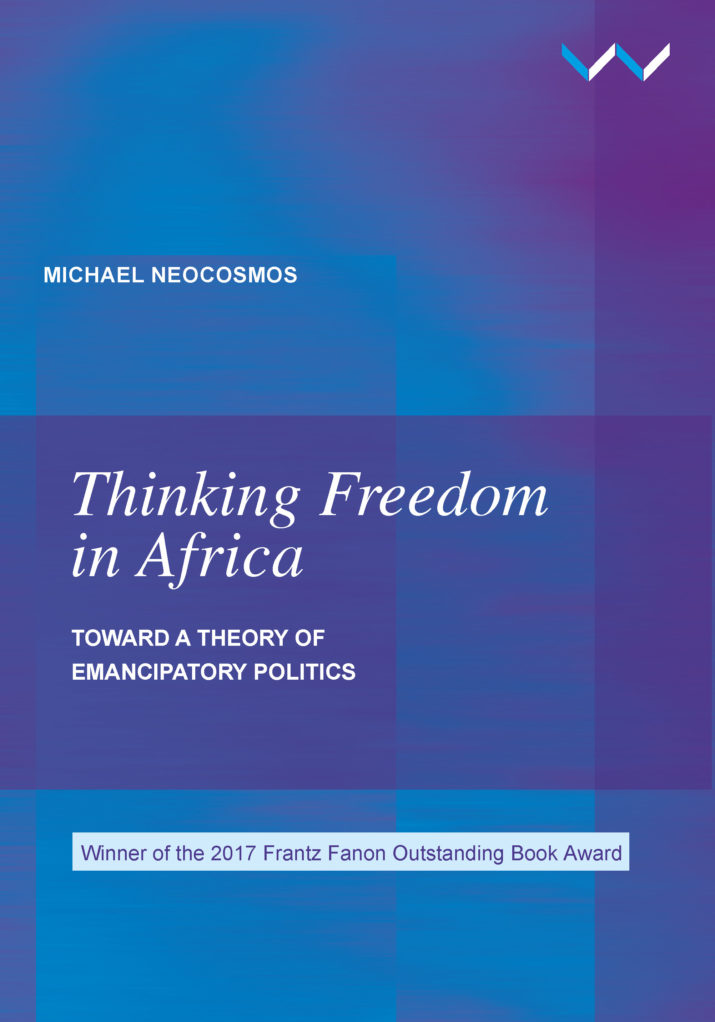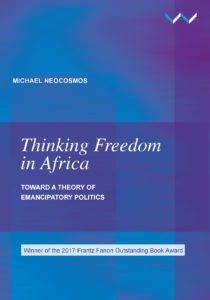

This is part of our special feature, Beyond Eurafrica: Encounters in a Globalized World.
When Nelson Mandela became South Africa’s first democratically elected president in 1994, much of the Western world rejoiced at the prospect of a “reasonable” transition from apartheid to liberal democracy on the African continent. Mandela was seen by many as the best equipped to realize the goals of freedom, justice, and equality in the African country that had remained under white settler domination for longer than any other on the continent. Most attractive to Westerners was the sense that Mandela could do all of this while operating under what they saw as the essentially European principles of the liberal political tradition—individual rights, respect for private property, and adherence to the rules of the free market.
Twenty-five years later, Mandela’s South Africa remains fraught with bitter divisions, and the party he was loyal to—the African National Congress—is rife with corruption and in-fighting. After Thabo Mbeki was forced from his position as party ruler in 2007, his successor Jacob Zuma suffered the same fate in late 2017, in an even more infamous downfall. And while Zuma stands accused of “state capture,” his own successor, Cyril Ramaphosa—once an admired veteran of the anti-apartheid trade union movement—is now recognized for being one of the country’s richest men, and for his role in encouraging the brutal 2012 police crack-down on the striking miners at Marikana, thirty-four of whom were massacred by the state.
And yet, in the eyes of many commentators—especially those in Europe—South Africa remains a model liberal democracy, with one of the most respected and celebrated constitutions in the world. How could such principles of liberal democracy co-exist so easily with so much anti-black violence, inequality and corruption? And how could one of the most promising liberation movements on the African continent fall so short of its objectives? Michael Neocosmos’s book, Thinking Freedom in Africa: Toward a Theory of Emancipatory Politics, provides some very sharp answers to these questions by demanding a wholesale rethinking of the concept of politics.
Thinking Freedom in Africa is many things. Part political philosophy, part intellectual history of the African emancipatory tradition, part critique of the social sciences, and part handbook for militants, the book’s sweeping interventions jump off the pages throughout the at times dense 600+ pages. At the core of this study lies the project of radically reconstructing Marxism from the ground up, most prominently embodied in the philosophy of French theorist Alain Badiou, and his fellow travelers, Sylvain Lazarus and Ernest Wamba-dia-Wamba. Neocosmos adopts their collective project of a search for a liberatory political framework adequate to the changing global conditions of the twenty-first century.
This requires abandoning a traditional Marxism that remains stubbornly tied to a theory of class based on economism and a theory of political change that still romanticizes the role of a fading and discombobulated industrial proletariat. As such, thinking from Africa, but together with European philosophers, Neocosmos aims first and foremost at a re-conceptualization of agency. As the author puts it: “How are we to begin to think human emancipation in Africa today after the collapse of the Marxist, the Third World nationalist, as well as the neo-liberal visions of freedom?” (xii)
Paralleling the work of Michel Foucault and Sylvia Wynter, Neocosmos takes aim at the social sciences for their empiricism. Empiricism remains tied to what exists, and therefore forecloses the study of the emergent, the possible, and the radically new. Against the stranglehold of empiricism, Thinking Freedom in Africa aims to focus on a more specific conceptualization of politics. This limited notion of politics emphasizes emancipatory political subjectivities that necessarily exceed what we thought was possible in a given reality. Unfortunately, such “reality” is too often framed by academics through a dull empiricism that is content to “express” what simply is, rather than search for what might “exceed” and therefore transcend our normal conditions.
For Badiou, Lazarus, Wamba-dia-Wamba and Neocosmos, this entails “thinking at a distance from the state” in order to identify those historical sequences in the liberatory tradition when the dialectic between what is and what could be was most alive with productive tension. This requires a re-reading of radical politics such that major revolutionary events are not celebrated for their ability to take state power, but for the radically democratic and egalitarian principles they activated in the course of their unfolding.
The study of emancipatory political subjectivities proceeds in the book along two axes which cut against the grain of the two dominant academic disciplines of history and sociology. The first part of the book is therefore an historical exploration of the African liberatory tradition that begins in pre-colonial Africa, traverses the Atlantic to Haiti in emphasizing the profoundly African influence on the Haitian Revolution by way of the Lemba healing spiritual cult, and jumps to the mid-twentieth century’s continental struggles for national liberation and the anti-apartheid mass movement in the 1980s. Throughout this genealogy, Neocosmos borrows from Sylvain Lazarus’s framing of politics as “a sequential subjectivity”—i.e. something that appears periodically in sequences before retreating, like Marx’s subterranean mole. This formulation is intended to be a critique of the discipline of history, which according to Neocosmos remains mired in a conceptualization of change over time as mere “continuous unfolding”(37), unable to capture radical breaks. As such, his emphasis is on identifying those exceptional moments when politics bursts to the foreground, as periods of activity when people collectively and temporarily manage to exceed the conditions of their subjection. Borrowing heavily from Alain Badiou, Neocosmos argues that “Exceptions are not thinkable within empiricism other than as externalities themselves…‘If the expression ‘to change the world’ is to have any meaning at all, it must be that real change resides on an impossible point, but one which becomes possible during circumstances which are always of an exceptional nature’”(39).
These exceptions produce excessive subjectivities, and this idea lies at the core of Neocosmos’s reconceptualization of the idea of the agency. Mere agency is not enough for him. Rather, an excessive subjectivity is brought into being only when ideas are produced by, and activated in, struggles which depart from their specific identities and instead reach out for universal principles such as freedom and equality.
Part two of the book takes aim at sociology, the other dominant discipline in the reading of “social movements.” For Neocosmos, much of sociology stumbles in its emphasis on the social as the empirical, and as such, relies upon a statist conception of politics. As a result, social movements are too often conceptualized in terms of their relation to the state, their ability to make claims on the state, or the violence they suffer at the hands of the state. None of these positions manage to exceed the given state of things, and therefore fail to qualify for Neocosmos’s much more limited understanding of politics as the expression of emancipatory subjectivities that exceed the given by calling out for universal forms of equality and freedom. What is required in these moments are necessarily non-statist modes of organization that exceed the tools of prior sequences of politics such as the political party or the guerilla organization, and succeed in transcending the logic of representation that these prior movements also relied upon. As Neocosmos explains of these prior frameworks, “Marxist political economy and sociology are unable to think politics, because they speak for people whom they assume to be silent” (303, my emphasis). Thinking with Jacques Ranciere, therefore, he argues that “a politics of excess over the social enables the thinking of a process of subjectivation, while the traditional conception of politics as representative of social interests fails to enable the rational understanding of this process” (256).
Nonetheless, given that part one of the book covered precisely such relatively brief moments of excess when emancipatory political subjectivities were emergent, part two focuses largely on analyzing the forms of state subjectivity in Africa which periodically retrench the status quo, curbing the emancipatory potential of prior movements.
In identifying the developmental state, civil society, and the human rights project as forms of state subjectivity that ultimately fail to open up enduring emancipatory subjectivities, Neocosmos is not focused exclusively on critique. Thinking against the grain of the likes of Mahmood Mamdani, for example, Neocosmos wants to rethink the political subjectivities that might exist in traditional African society. Whereas Mamdani’s work tends to emphasize the extent to which politics in traditional rural Africa remain the product of a top-down state logic of indirect and customary rule—think Hutu and Tutsi in Rwanda, Bantustans in South Africa, and “Arab” and “African” in Darfur—Neocosmos wants to identify a more complex terrain of contestation within so-called traditional society in Africa. Because these “traditional” societies emerged coeval with modernity, the usual opposition between the two no longer holds. At the same time, Neocosmos does not want to give up on the notion of tradition either, as he finds it a useful way of demarcating a separate domain of politics in Africa from that of civil society and human rights. Echoing the work of Latin American thinkers like Gustavo Esteva, Neocosmos argues: “The politics of tradition need to be transformed from within the domain of tradition itself, and not from outside in such a neo-colonial manner” (475). In sum, despite the reactionary nature of most traditional politics on the continent, Neocosmos is at pains to uncover more complexity in the politics of tradition. Returning to the overarching theme of the book—the attempt to uncover and re-think agency in a radical way—he insists that the people living under traditional rule cannot be conceived simply as the passive product of top-down state logics of power. Popular movements, too, mobilize the history of traditional societies towards more radical ends, so the politics of tradition must be thought in more heterogeneous terms. It is to traditional forms of African social healing—the mbongi among the Bakongo, the shir in Somalia, the gacaca in Rwanda, and the judiya in Darfur—that Neocosmos turns in order to highlight examples of the politics of tradition which open up more emancipatory possibilities. This uncovering of a more organic tradition of social healing is crucial to rethinking conflict resolution in non-statist terms. Even critical scholars often fall prey to statist solutions that seem to naively celebrate “African” institutions of governance such as the African Union over and against those of the United Nations or the G-7 powers, as though the only options for limiting and preventing violence lie with state institutions. Against this, Neocosmos argues that “a political challenge to a state-propagated culture of violence… must arguably be developed ‘from below.’” Placing faith in the thinking capacity of ordinary people, Thinking Freedom in Africa therefore contributes to a more expansive theorization of the politics of tradition, one that opens up the possibility of a grassroots “politics of peace.”
Much more can and should be said about the fascinating study that is Michael Neocosmos’s book. Because I find it to be such a foundational text for reconceptualizing politics through a conversation between primarily European philosophers and the African emancipatory tradition, I will end with a few open-ended reflections and questions which arose for me throughout my reading of the book. In accordance with Badiou’s thinking, the book embraces universal concepts. “From an emancipatory perspective, the point must be that movements have to propose something new, something additional, some alternative way of life, an ‘excessive’ politics. They must be ‘for’ something with a universal character (usually freedom, equality, dignity, justice) and not simply ‘against’ what exists or for a better place in the system”(198). In its embrace of such universals, therefore, the book knowingly flies in the face of decades of post-structuralist concern for difference. This is a bold move, and one that I found mostly convincing. But it also opened up a number of questions for me: to what extent does difference have a role to play in this renewed embrace of universals? More specifically, Neocosmos is very critical of what he calls identity politics because he believes identities can only reflect the given, extant conditions formed by the state. In place of the logic of identity, he puts forward Fanonian nationalism, and at times socialism, as universal platforms of struggle. At other times, he refers to nationalism and socialism as merely “more” universal, recognizing their own specificity. But the slippage between the two here—universal and “more universal”—is precisely what the entire post-structuralist debate, quickly dismissed as unhelpful for emancipatory politics in this text, tried to identify as worthy of theoretical reflection and critique, pointing out that all universal proclamations could in fact only be partial, and therefore necessarily exclusive of someone or something. Relatedly, one gets the sense that Neocosmos, while celebratory of the African emancipatory tradition, would be suspicious of something called a Black radical tradition, due to its affirmative mobilization of race in a manner that he might deride a mere identity politics. After reading the book, it remains unclear to me how a politics mobilized around a reformulation of race—such as that of Steve Biko and the Black Consciousness Movement—is necessarily more restrictive or identitarian in a negative sense than a politics mobilized around the idea of the nation. Rather than opposing such formulations, then, it would seem more appropriate, and more loyal to the ideas in the book, to insist upon the need to identify the dialectical tension between the limited statist and more universal emancipatory logics at play in all of these categories—race, nation, gender, class, ethnicity, sexuality—when mobilized in the course of struggle.
Thinking Freedom in Africa was awarded the 2017 Frantz Fanon Outstanding Book Award from the Caribbean Philosophical Association. This is a testament to the broad relevance of the book, as it manages to speak to the specificity of African politics on a continental scale while theorizing more generally about the prospects for emancipatory movements across the world. It is a bold call for rethinking many of our dominant and taken-for-granted categories of thought from the perspective of ordinary people seen as thinking subjects. As such, it deserves wide dissemination and careful study.
Reviewed by Yousuf Al-Bulushi, Goucher College
Thinking Freedom in Africa: Toward a Theory of Emancipatory Politics
By Michael Neocosmos
Publisher: Wits University Press
Paperback / 644 pages / 2016
ISBN: 9781868148660
Published on March 1, 2018.




